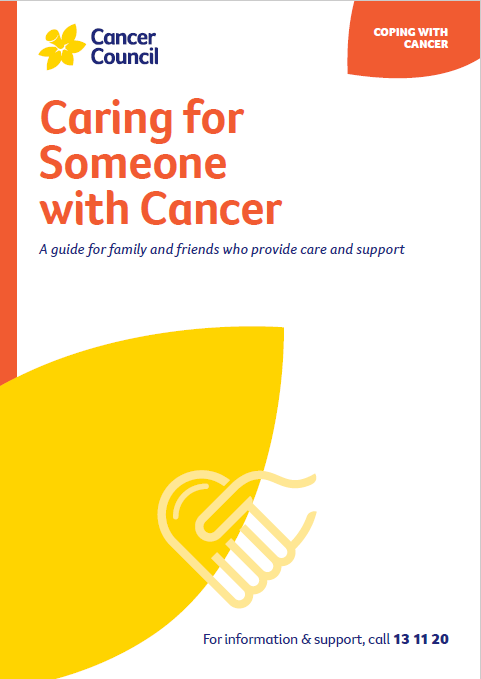- Home
- About Cancer
- Advanced cancer
- Facing end of life
- Caring for someone who is dying
- Providing practical support
Providing practical support
Many people worry about how they’ll manage the day-to-day tasks of caring for someone.
Learn more about:
Overview
To make it easier and safer to care for the person at home, you may need to modify the environment (e.g. handrails in the shower) or buy or rent equipment (e.g. shower and toilet chairs, bedpans, hospital bed).
Some carers prefer to provide personal care and practical support themselves and just need some guidance from a health professional, or occasional home help or respite.
Other carers find providing personal care awkward or overwhelming and prefer to have it given by someone else.
The palliative care team can help reduce your stress and free you up to spend time with the person you’re caring for in a way that is comfortable for you.
You may feel unable to care for someone at home and prefer that they receive specialist care in a hospital, palliative care unit or in a residential facility. Even then, you can still provide some personal care by helping with feeding, mouth care, bathing and toileting.
Practical ways to help
There are many things that family and friends can do to help support someone at the end of life. Many people want to help, but might not know how.
Let people know what the sick person may need, and what help you need as a carer. Perhaps one person can coordinate care or use an app such as Gather My Crew.
Prepare mealsPreparing meals can become challenging. If possible, ask the person what they want to eat. Offer simple, small meals and mash food so it’s easier to swallow. A dietitian can give advice on preparing food. If friends offer to cook, let them know what meals are suitable. As the disease progresses, the person may lose their appetite, taste and may not be able to eat or drink. Don’t force them to eat or drink. Chips of ice can moisten the mouth. | |
Help with bathing and toiletingYou may have to give the person a sponge bath, wash their hair over a basin, help them on and off the toilet or commode, help them use a urine bottle or bedpan, and help them to wipe themselves. An occupational therapist can help choose suitable equipment and teach you how to lift safely and correctly. You may need someone to physically help you with this. | |
Sort out the paperworkGetting their affairs in order can give people closure to their life. Help gather important documents, discuss the person’s choices for their future health care (e.g. substitute decision- maker), and arrange legal advice if needed. | |
Record social media detailsPeople often have more of a social media presence than they realise. Help the person list their social media accounts, passwords and what they want to have happen to them after they die. | |
Do odd jobs and run errandsFriends may be able to help with walking the dog, mowing the lawn, picking up the kids, or doing the shopping or laundry – anything that eases the workload of the main carer. Some volunteer organisations may be a le to help with suitable practical jobs too. | |
Manage medicinesIf you feel overwhelmed about giving medicines, ask your doctor, pharmacist or nurses for suggestions. A pharmacist can put tablets and capsules into a blister pack (Webster-pak), which separates them into the days and times they need to be taken. Learn tips for managing medicines. | |
Help with getting in and out of bedIt’s common for a dying person to spend more time in bed. You may need to help them get in and out of bed, roll them over regularly so they don’t get bedsores, or lift them to change the sheets. You can use equipment to help with lifting. Talk to the palliative care team about borrowing a pressure relieving mattress or hospital style bed. Many people make space in the living room for a bed, particularly if bedrooms are located upstairs. |
→ READ MORE: Providing emotional support
Podcast: End-of-Life Care at Home
Listen to more of our podcast for people affected by advanced cancer
Prof Jane Phillips, Head, School of Nursing and Professor, Centre for Healthcare Transformation, Queensland University of Technology and Emerita Professor Palliative Nursing, University of Technology Sydney, NSW; Prof Meera Agar, Palliative Care Physician, Professor of Palliative Medicine, University of Technology Sydney, IMPACCT, Sydney, NSW; Sandra Anderson, Consumer; A/Prof Megan Best, The University of Notre Dame Australia and The University of Sydney, NSW; Prof Lauren Breen, Psychologist and Discipline Lead, Psychology, Curtin University, WA; David Dawes, Manager, Spiritual Care Department, Peter MacCallum Cancer Centre, VIC; Rob Ferguson, Consumer; Gabrielle Gawne-Kelnar, Counsellor, Psychotherapist and Social Worker, One Life Counselling & Psychotherapy, NSW; Justine Hatton, Senior Social Worker, Southern Adelaide Palliative Services, Flinders Medical Centre, SA; Caitlin MacDonagh, Clinical Nurse Consultant, Palliative Care, Royal North Shore Hospital, Northern Sydney Local Health District, NSW; McCabe Centre for Law and Cancer; Palliative Care Australia; Belinda Reinhold, Acting Lead Palliative Care, Cancer Council QLD; Xanthe Sansome, National Program Director, Advance Care Planning Australia; Kirsty Trebilcock, 13 11 20 Consultant, Cancer Council SA.
View the Cancer Council NSW editorial policy.
View all publications or call 13 11 20 for free printed copies.
